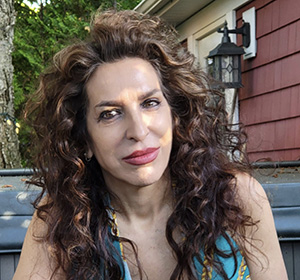Mary Lynk (BAвҖҷ84) ended up on a path to journalism at a very young age thanks to her familyвҖҷs influence, with books all around and fascinating dinner guests stopping by regularly.
вҖңIf my mother met an intriguing stranger, within five minutes they received a dinner invitation,вҖқ says Lynk.Мэ
During these dinners at her childhood home in Halifax, ideas and debates flew around the table.Мэ It was there, she says, that journalism began to seep in through an вҖңact of osmosis.вҖқ
вҖңMy father was a master in asking questions and getting people to open up,вҖқ she says.
 Lynk, shown right, has built an incredible career following her own journalistic impulses, carving out a specialty for coverage exploring human rights issues, world politics, social issues and philosophy. She revels in talking to interesting people, something she gets to do a lot currently as a journalist and producer for CBCвҖҷs .Мэ
Lynk, shown right, has built an incredible career following her own journalistic impulses, carving out a specialty for coverage exploring human rights issues, world politics, social issues and philosophy. She revels in talking to interesting people, something she gets to do a lot currently as a journalist and producer for CBCвҖҷs .Мэ
Next week, sheвҖҷll dip her toes into yet another timely and compelling discussion as moderator of the fifth-annual installment of The Stanfield Conversations on Democracy, this year focused on challenges to the rule of law and the future of liberal democracy.Мэ
She says sheвҖҷs already had preliminary chats with this yearвҖҷs featured speakers Asha Rangappa, a senior lecturer at YaleвҖҷs Jackson School of Global Affairs and former FBI special agent, and Wayne MacKay, professor emeritus in DalвҖҷs Schulich School of Law, about what she considers a vital conversation.Мэ
вҖңIвҖҷm excited to hear the ideas of Asha and Wayne, not just about the perils of our time but also what can be done to bolster democracy,вҖқ she says. вҖңThese are serious times in terms of threats to liberal democracies.вҖқ
Lynk says Rangappa and MacKay are sure to bring compelling insights for audiences.Мэ
вҖңWhat we are witnessing right now in the United States is disconcerting when it comes to the law and political interference. Lines are being crossed that once seemed unimaginable. And Asha is a leading expert on this topic. As for Wayne, he has so much insight into CanadaвҖҷs legal weak spots and whether the erosion of law that we are seeing in the U.S. could happen here.вҖқ
A worldview emerges
Lynk followed her parentsвҖҷ lead in studying at pilipiliВю»ӯ, completing a Bachelor of Arts degree in political science вҖ” a subject she says was critical to her career in journalism.Мэ
вҖңI think itвҖҷs incredibly beneficial for journalists to study more than just journalism . . . to become more nuanced and informed reporters,вҖқ she says.Мэ
Lynk also holds a certificate in Civilisation Française from La Sorbonne in France.
She says both experiences вҖңreally sharpenedвҖқ her critical thinking and research skills.Мэ
This was once again complemented by her parentsвҖҷ influence, which shaped her emerging interest in human rights.Мэ
вҖңThey taught us to be aware of injustices and to be of service to others. Politics was constantly discussed,вҖқ she says, noting household discussion aboutМэ ending Apartheid in South Africa, the persecution of Baha'is in Iran, and conflicts in the Middle East.Мэ
To step out of my cultural idiosyncrasies and see the world from a different angle made me more of a world citizen.
She says that was fortified by her time at La Sorbonne and living in northern India at the time of Indira Gandhi's assassination.Мэ
вҖңTo step out of my cultural idiosyncrasies and see the world from a different angle made me more of a world citizen,вҖқ she says.Мэ
Lynk recounts how she continues to put this perspective to use in recent works she has done for IDEAS and for an investigative podcast series called The Kill List.
вҖңIt investigated the mysterious death of a young activist in Canada, who had fled Pakistan,вҖқ she says of her work with The Kill List.МэМэ
'Knowledge is power'
Lynk says she hopes audience members leave with some new ideas from this yearвҖҷs discussion.Мэ
МэвҖңKnowledge is power. So, hopefully the audience will gain knowledge, insight and also be delighted at times with the joy of learning new ideas. And perhaps leave with a path forward.вҖқМэ
The conversation will also be recorded for IDEAS and will be broadcast on CBC at a later date.
Lynk's excitement heading into the event has left her recalling memories of conversations she herself had while at Dal.
вҖңWhat I remember the most about pilipiliВю»ӯ is the conversations I had with fellow students,вҖқ she says, mentioning Dr. David Black вҖ” a friend who went on to teach political science at Dal and asked her to participate in this year's event.
To learn how you can participate in the 2025 Stanfield Conversation, visit www.dal.ca/fass/stanfield-conversations

